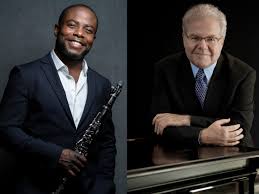by Daniel Hathaway

At noon, organist Jonathan W. Moyer plays North German music by Matthias Weckmann, Wilhelm Karges, Heinrich Scheidemann, and Dietrich Buxtehude at the Church of the Covenant in University Circle.
Tonight at 7:30, the Gateways Brass Collective, the resident ensemble of the Rochester-based Gateways Music Festival, performs music by Kevin McKee, Margaret Bonds, George Walker, Herbert T. Smith, and others in Mixon Hall at CIM.
And the Oberlin Artist Recital Series continues at 7:30 in Finney Chapel with New York Philharmonic clarinetist Anthony McGill and pianist Emanuel Ax performing works by Robert Schumann, Jessie Montgomery, Franz Schubert, Ludwig van Beethoven, Florence Price, James Lee III, and Leonard Bernstein.
For details of upcoming events, visit our Concert Listings.
ANNOUNCEMENTS:
The Cleveland Orchestra has announced two upcoming program changes. On February 20 and 22, mezzo-soprano Sasha Cooke will step in for Kelley O’Connor in Thomas Adès’s America: A Prophecy. And for the concerts on May 8, 9, and 10, conducted by Franz Welser-Möst, the previously-unnamed new work written by Allison Loggins-Hull, the Orchestra’s Daniel R. Lewis Composer Fellow, now has a title: Grit. Grace. Glory. On that same program, Prokofiev’s Symphony No. 3 will be replaced by Prokofiev’s Symphony No. 4.
TODAY’S ALMANAC
On this date in 1912, conductor Erich Leinsdorf was born in Vienna. The vicissitudes of history took him to New York’s Metropolitan Opera in November, 1937, a few months before Hitler’s Anschluss made a return to Austria impossible. Freshman U.S. Representative Lyndon B Johnson took Leinsdorf under his wing and he eventually became a naturalized U.S. Citizen in 1942. (Read the transcript of an oral history interview where Leinsdorf recalls his experiences with Johnson and the federal government.)
He was voted the third conductor of the Cleveland Orchestra in 1943 by the board of directors (who chose him over another candidate, Georg Szell). But Leinsdorf received and decided not to challenge a draft notice in October of that year, and joined the U.S. Army for barely a year. By the time he was discharged in September, 1944, sentiments in Cleveland had changed, and Szell had made an impressive debut with the Orchestra. Leinsdorf, still under contract, submitted his resignation. After Szell died, Leinsdorf began appearing frequently as guest conductor in the 1980s.
Here are three live Cleveland Orchestra performances led by Erich Leinsdorf: Beethoven’s Seventh Symphony, Schumann’s Third Symphony, and the conductor’s own Suite from Debussy’s opera, Pelleas et Melisande.
I can’t resist telling a Leinsdorf story. When I was in college in the 60s, the Harvard Glee Club and Radcliffe Choral Society frequently sang with the Boston Symphony under his direction. One memorable performance was Schumann’s Scenes from Goethe’s ‘Faust’ in 1966 with the New England Conservatory Chorus and a starry cast of soloists: Hermann Prey, Beverly Sills, Charles Bressler, Thomas Paul, Veronica Tyler, Tatiana Troyanos, Florence Kopleff, and Batyah Godfrey.
The first chorus/piano rehearsal on the Symphony Hall stage did not go well. Leinsdorf had the flu and we were singing from scores that only printed our individual voice lines with cues like instrumental parts. Leinsdorf grew more and more impatient and finally said, “I am going to leave you in the hands of your chorus masters and if you can’t learn the music, we’ll replace it with … the Brahms Academic Festival Overture.” And he stormed offstage through the central door between the two halves of the chorus — after which we terrified singers spent another hour and a half drilling cues.
I learned only years later that Leinsdorf had never used that door before — which only led to a room where they stored timpani and the organ console. Having made a dramatic exit, he could hardly have crept back onstage again, so he paced for 90 minutes until the stage was clear. (The performances went beautifully, by the way. Listen to one of them here.)



